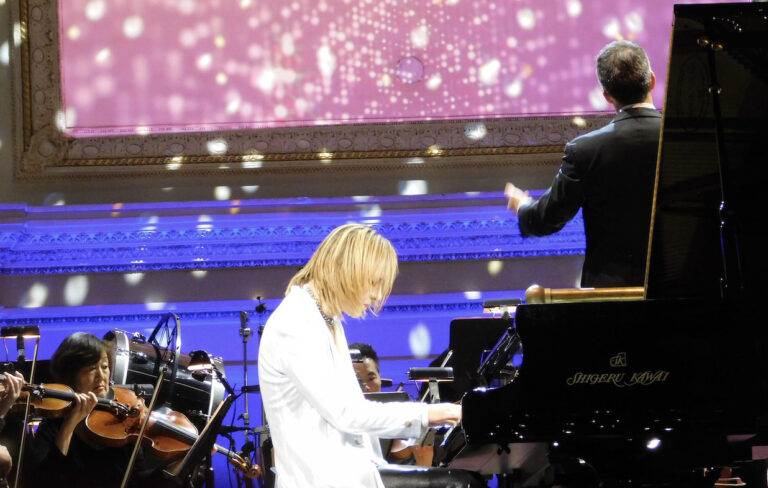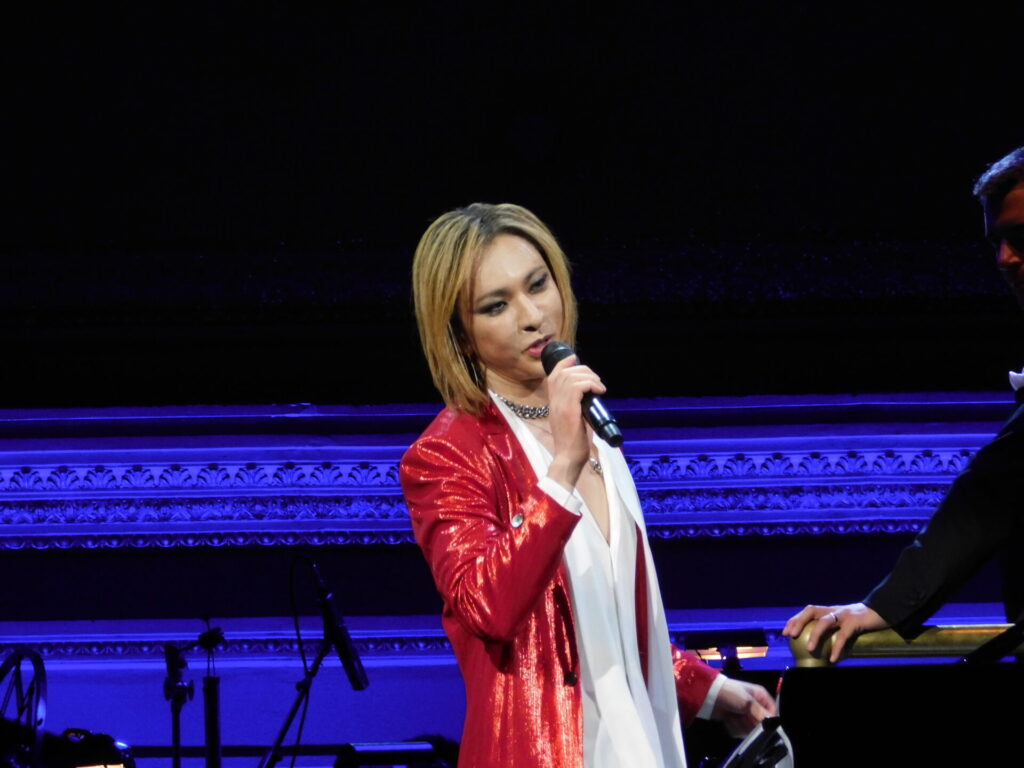
Photo by Nobuhiro Hosoki
Synopsis : “Yoshiki : UNDER THE SKY” gathers an extraordinary collection of international artists such as Sarah Brightman, The Chainsmokers, Nicole Scherzinger, St. Vincent, and more. Directed by International Rock Star and Composer Yoshiki, he take us into a post pandemic for an emotional journey through the pain of losing loved ones and uniting globally through the healing power of music.
New music documentary film, “Yoshiki : UNDER THE SKY” will be released in the US and UK, with limited engagement showings announced for November and December.
Yoshiki recently became the first Japanese artist to be honored with a handprint and footprint ceremony at the Chinese Theatre in Hollywood since the tradition began in 1927.
Yoshiki Returned to headline a sold-out concert at Carnegie Hall last week in New York City, after dazzling audiences and receiving standing ovations at Royal Albert Hall in London, Tokyo Garden Theater, and Dolby Theatre in Hollywood. This marks the first time a Japanese artist has headlined all these historic venues.
 Photo by Nobuhiro Hosoki
Photo by Nobuhiro Hosoki
Q&A with Director/Composer Yoshiki
Q: Now that you’ve shown the film and you played your concert last night please talk about the expereince.
Yoshiki: Thank you so much for coming. Yes, I just played Carnegie Hall last night. It’s one place I know well.
Q: How did you choose the artists that you wanted to have in your film “Yoshiki : Under The Sky”? Were there particular artists that you included who you had seen before or people that you wanted to always meet? And then how did you decide the order?
Yoshiki: Good question. It’s a combination. Let’s see… Let’s take someone such as Sarah Brightman. I have been working with her for a long time. I composed one of her songs with her composer/pianist for her world tour. She was one of my first choices, so you know that she kindly said yes to join my project. Then there’s Nicole Scherzinger. I happened to have known her before she joined the Pussycat Dolls — for a long time.
She came to my concert in Tokyo. We performed together but I hadn’t seen her for a long time. Then because of this project, we reconnected. And it was amazing to work with Lindsey Stirling, a beautiful violin player. Right before COVID, we were talking about collaborating. We had mutual friends and then she came to my recording studio in Los Angeles. Then we said, “OK, let’s do something” but then COVID happened. Then, again, why not? I asked her if she would join my project. The Scorpions. Yes. We have a mutual friend and then, there’s their song, “Winds of Change.” Such an iconic song. I was wondering if I could collaborate with Scorpions; then it just happened. So [founder Rudolf Schenker]’s friend who’s a producer, said, “Yeah, they would like to join your project as well.” Yes.
Q: You’ve been the subject of award-winning documentaries. Your music has been involved in film for many, many years. What led you to make the big step of becoming a director? What was the most challenging part of that?
Yoshiki: Yes. The film was “We are X.” The amazing director Steven Kijak made the film about my band X Japan. It’s almost like it was a too-crazy-to-be-true story. Basically two members of X committed suicide [or so it seemed]. [And Toshi left the band as well] because, I believe, he got brainwashed and joined the cult or something like that. Yeah, it’s almost too crazy to be a true story.
That is the one we were showing in the film. Anyhow — how do you say it? — we got the audience award for best edit of a documentary at the Sundance Film Festival in 2016. Yes, then we went to South by Southwest where it won another award. With that film, I was, yes, just a subject but I was very involved. I’m trying not to cross the line.
I respected the director. So I told Steven “Do whatever you want.”. So when I started this project, “Yoshiki : Under the Sky” — it was different. I wanted to know the small details but go to the big picture. I wanted to know how I could do it in my own way. I’ve been learning how those amazing directors filmed because I was now so involved. I love to produce the music video, and have actually worked with David Lynch, a long time ago. He directed one of my music videos. Yes. Yeah, that’s right. I just remember, I should have thought about it then. Oh, yes. So I’ve been learning from amazing directors now. I was like, “Ok, if I direct the film, this is how it’s going to happen.”
 Photo by Nobuhiro Hosoki
Photo by Nobuhiro Hosoki
Q: Has it always been something that you aspired to do? And was this your first time playing in Carnegie Hall?
Yoshiki: This was actually my second time that I played Carnegie Hall — the first was in the year 2017. Yeah, to play Carnegie Hall, that was one of my dreams. Oh my God, yesterday it was pretty much like Halloween. Right. I was wondering, what kind of outfit should I be wearing?Well, playing the Carnegie Hall, I don’t think I should be doing this. So I just played in my usual way. I played with rock drums last night — playing Carnegie Hall was so amazing. But I played here in New York in Madison Square Garden with X-Japan in 2014. Yes. So yes, New York is one place where I have a lot of great memories.
Q: How long did it take you to make the film? The logistics must have been crazy.
Yoshiki: Yes. Right. It took three years. Yes. Also, I wanted to collaborate with my fans but did not know how to tell that story. Of course, I found out, when one of my fans was messaging me through social media. I happened to be filming that moment. He was like, “my wife is dying. Could you help? I sent you some messages.” I thought about that, that this could be for real or not. But I did it anyway.
Then, a few weeks later, I had another shooting opportunity. I was shooting in Los Angeles. Actually, I was in Malibu, when my staff found out about him. So we went back and forth several times through text messages. I mean, through social media, I still didn’t know if that’s for real or not. But I took a chance. I had a film camera in Malibu, then I said,” If it’s OK, could I send my crew to you to shoot and read the Zoom call?”
He could not be real, he does not exist? Maybe he could be an AI, but I took a chance. I sent like three of my film crew to his place even though I didn’t know he would even show up in his bedroom. I was like, “OK, let’s do it.” Then he happened to be real. Then we did the call together. It was a very touching moment. Connected to my fans like that. It still makes me want to cry.
Talking about this, because of that, things happen, so my direction of the film changed a lot. The importance of connecting people, supporting each other, doesn’t matter if you are an artist, a rock star or fans. We all, we’re going to make this world beautiful together.That Zoom call really inspired me to, how do you say it, structure this film.
Q: Talk about the evolution of your craft. You seem to be fantastic on so many instruments. How did that go from being four years old at the piano? You were 10 years old when you discovered rock and the guitar, right?
Yoshiki: Yes. My parents bought me a piano like when I was four years old, I started taking classical lessons. Usually, kids don’t like piano but I liked it. I thought I was going to become a classical pianist. But when I was 10, my father passed away. Actually, he took his own life. It was very sad. At the same time. I was really angry. I didn’t know what to do because he left this world. So then my mother bought me a drum set.
I started banging drums, not the music I just wanted to bang on a drum set. Then I realized that I could read the score and I said, “Oh, it’s not such a bad idea.” I started playing a show on drums, and then, became a professional drummer. Actually, I went through more instruments.
I played trumpet for five years. There was a competition for trumpet. My mother came and took a picture. I did not like the picture. I did not like how my face looked when I was playing trumpet. So I played guitar in the studio. Between the piano and drums, you can pretty much play anything. But I’m not good at singing [laughs].
Q: As a musician, do you feel a responsibility or have a calling to bring more healing to the world — especially now? Is it something you feel calm about or is responsible for? I’m so curious because with your music, you just feel so much that you don’t [say it] when you speak? And thank you for that.
Yoshiki: Yes, I think the artist should help support what’s going on in this world. I think so because the music or art world pretty much have no boundaries. Like a musical note. It’s one language. Right now, the world is really divided. As an artist, as a musician, we should stand up and try to spread love. We can express that we are here to support each other, not hate each other. So, yeah, I want to keep doing that.

